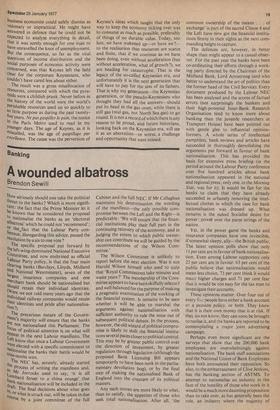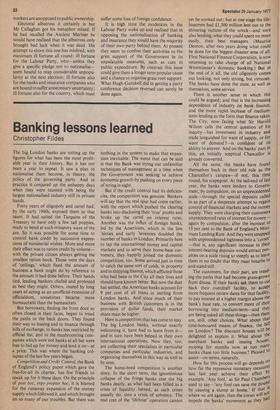Banking
A wounded albatross
Brendon Sewill llow seriously should one take the political threat to the banks? Which is more significant: the fact that the Prime Minister let it be known that he considered the proposal to nationalise the banks as an 'electoral albatross which he could not 'recommend'; or the,fact that the Labour Party conference, disregarding this advice, passed the resolution by a six to one vote? The specific proposal put forward by L left-wing-dominated National Executive Committee, and now enshrined as official Labour Party policy, is that the four main clearing banks (Barclays, Lloyds, Midland ,nd National Westminster), seven of the largest . insurance companies and one nlerchant bank should be nationalised but should retain their individual identities. Nwere we not told many years ago that the I,nclividual railway companies would retain their identities and pride after nationalisation?) The precarious nature of the GovernInent's majority will ensure that the banks a,re not nationalised this Parliament. The locus of political attention is on what will appear in the next Labour manifesto. The 1-eft know that once a Labour Government were elected with a specific commitment to nationalise the banks their battle would be nine-tenths won. I, The NEC has, astutely, already started ,..ne Process of writing the manifesto and, Mr Jorrocks used to say, 'it is all rmbard Street to a china orange' that ,ank nationalisation will be included in the raft. The final decisions about what goes Or what is struck out, will be taken in due '-ourse by a joint committee of the full
Cabinet and the full NEC. If Mr Callaghan maintains his determination the wording of the manifesto—the only possible compromise between the Left and the Right—is predictable: 'We will ensure that the financial institutions play their full part in the continuing recovery of the economy, and in judging the extent to which public ownership can contribute we will be guided by the recommendations of the Wilson Committee.'
The Wilson Committee is unlikely to report before the next election. Was it not Harold Wilson himself who used to quip that 'Royal Commissions take minutes and waste years?' The membership of the Committee appears to have been skilfully selected and well balanced for the purpose of making a pragmatic examination of the working of the financial system. It remains to be seen whether it will be able to marshal the arguments against nationalisation with sufficient authority to rule the issue out of subsequent political debate. In the process, however, the old wizard of political compromise is likely to shift the financial institutions several paces closer to political control. This may be by greater public control over the direction of investment, by greater regulation through legislation (although the proposed Bank Licensing Bill appears temporarily to have been sunk in the parliamentary devolution bog), or by the final step of making the nationalised Bank of England into the creature of its political masters.
Any such moves are more likely to whet, than to satisfy, the appetites of those who seek total nationalisation. After all, 'the common ownership of the means . . . of exchange' is part of the sacred Clause 4 and the Left have now got the financial institutions firmly in their sights as the next commanding height to capture.
The defences are, however, in better shape than might appear to a casual obser ver. For the past year the banks have been co-ordinating their efforts through a working party directed by the Chairman of the Midland Bank, Lord Armstrong (and who better to understand the art of politics than the former head of the Civil Service). Every document produced by the Labour NEC has been analysed and the scores of factual errors (not surprisingly the bankers and their high-powered Inter-Bank Research Organisation tend to know more about banking than the juvenile researchers at Transport House) have been pointed out with gentle glee to influential opinionformers. A whole series of intellectual pamphlets, bank reviews and articles have succeeded in thoroughly demolishing the arguments put forward in favour of bank nationalisation. This has provided the basis for extensive press briefing (in the period around the Labour Party conference over five hundred articles about bank nationalisation appeared in the national and regional press; only one, in the Morning Star, was for it). It would be fair for the banks to claim that they have already succeeded in urbanely removing the intel lectual clothes in which the case for bank nationalisation was dressed up. What remains is the naked Socialist desire for power: powet over the purse strings of the nation.
Yet, in the power game the banks and insurance companies have one invincible, if somewhat sleepy, ally—the British public.
The latest opinion polls show that only 1 I per cent are in favour of bank nationalisa tion. Even among Labour supporters only 23 per cent are in favour. 63 per cent of the public believe that nationalisation would mean less choice, 73 per cent think it would mean higher charges and 71 per cent fear that it would be too easy for the tax man to investigate their accounts.
These opinions matter. Over four out of every f,:. people have either a bank account or a pension policy, or both. They know that it is their own money that is at risk. If they do not know, they can soon be brought to realise it, and the banks are reported to be contemplating a major joint advertising campaign.
Perhaps even more significant are the surveys that show that the 200,000 bank employees are overwhelmingly against nationalisation. The bank staff associations and the National Union of Bank Employees have both announced their opposition. So also, to the embarrassment of Clive Jenkins, has the banking section of ASTMS. To attempt to nationalise an industry in the face of the hostility of those who work in it would be a much more daunting proposition than to take over, as has generally been the rule, an industry where the majority of workers are unopposed to public ownership.
Electoral albatross it certainly is but Mr Callaghan got his metaphor mixed. If he had recalled the Ancient Mariner he would have realised that the albatross only brought bad luck when it was dead. His attempt to shoot this one has misfired, with maximum ill fortune all round: ill fortune for the Labour Party, who—unless they give a specific pledge not to nationalise— seem bound to reap considerable unpopularity at the next election; ill fortune also for the banks and insurance companies who are bound to suffer unnecessary uncertainty; ill fortune also for the country, which must suffer some loss of foreign confidence.
It is high time the moderates in the Labour Party woke up and realised that in opposing the nationalisation of banking and insurance they would have the majority of their own party behind them. At present they seem to confine their activities to the grim support of the Government in its unpalatable measures, such as cuts in public expenditure. By contrast this issue could give them a longer term popular cause and a chance to organise grass root support. What Hugh Gaitskell did in getting a party conference decision reversed can surely be done again.











































 Previous page
Previous page